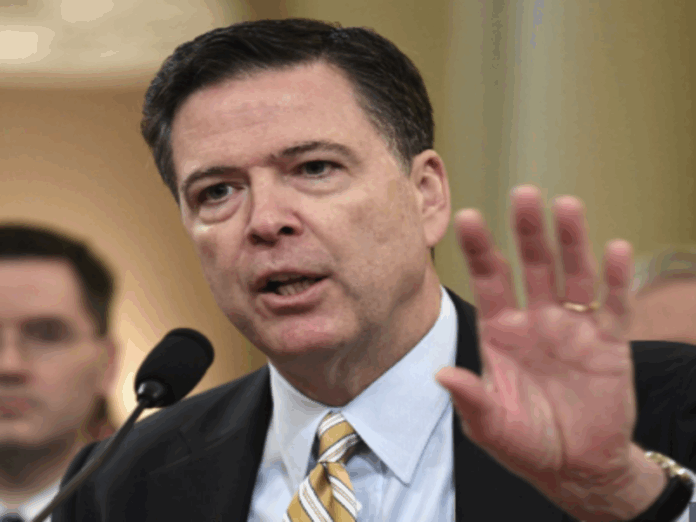A Federal Grand Jury Alleges Comey Misled Congress In 2020 Testimony On Russia Probe
Friday, September 26, 2025, 7:00 A.M. ET. 5 Minute Read, By Art Fletcher & Jennifer Hodges: Englebrook Independent News,
ALEXANDRIA, VA. – Today, former Federal Bureau of Investigation Director James Comey will surrender to federal authorities after being indicted by a Federal Grand Jury, charging him with making false statements to Congress and obstructing a congressional proceeding.
According to U.S. Attorney Lindsey Halligan, on Thursday, September 25, 2025, a Federal Grand Jury returned an indictment charging James B. Comey, Jr., 64, with one count of Making a False Statement; and one count of Obstruction of Justice in connection with his oral testimony before the U.S. Senate Judiciary Committee on September 30, 2020.
The Charges Allege;
The indictment, returned early Thursday night by a Virginia federal grand jury, alleges that Comey made false statements during his oral testimony before the U.S. Senate Judiciary Committee on September 30, 2020, concerning whether he had authorized someone at the Federal Bureau of Investigation to act as an anonymous source in media reports connected to the Russia‐interference investigation. Comey is also charged with obstruction of a congressional proceeding for allegedly misleading the Senate Judiciary Committee during that same testimony.
Background, Timing, and Related Moves;
The allegations in the case stem from an oversight related to the Russia probe, officially known as “Crossfire Hurricane,” which first began in 2016. Comey led the FBI from 2013 until being dismissed by President Donald Trump in 2017.
The indictment comes just days after President Trump publicly demanded that the Justice Department move immediately to prosecute his perceived critics and adversaries. Trump had also previously criticized the FBI investigation and made public statements urging for prosecutions related to Russia‐interference matters.
In between, there was turnover in the U.S. Attorney’s Office for the Eastern District of Virginia. The former U.S. Attorney, Erik Siebert, reportedly expressed reservations about bringing charges against Comey due to concerns about whether there was sufficient evidence. He was replaced by Lindsey Halligan, a former White House attorney with no prior experience as a federal prosecutor, who signed the indictment.
Comey has been scheduled to be arraigned on the charges on October 9, 2025, in the United States District Court for the Eastern District of Virginia, Alexandria Division.
Significance & Implications;
This indictment is historically significant, as it marks a rare case of a former senior federal law enforcement official being criminally charged in connection with his own testimony before Congress. Legal experts suggest the government faces challenges proving that Comey knowingly made false statements under oath and that he engaged in obstruction with intent.
It also raises broader questions about the independence of the Justice Department, prosecutorial discretion, and whether political considerations are influencing legal decisions at high levels. The case is likely to be heavily litigated, both on the facts and on issues of law, possibly including motions to dismiss and disputes over the credibility of testimony.
“The charges as alleged in this case represent a breach of the public trust at an extraordinary level,” said U.S. Attorney Halligan. “The balance of power is a bedrock principle of our democracy, and it relies upon accountability and a forthright presentation of facts from executive leadership to congressional oversight. Any intent to avoid, evade, prevent, or obstruct compliance is a violation of professional responsibility and, most importantly, the law.”
“No one is above the law,” said Attorney General Pam Bondi. “Today’s indictment reflects this Department of Justice’s commitment to holding those who abuse positions of power accountable for misleading the American people. We will follow the facts in this case.”
“Today, your FBI took another step in its promise of full accountability,” said FBI Director Kash Patel. “For far too long, previous corrupt leadership and their enablers weaponized federal law enforcement, damaging once proud institutions and severely eroding public trust. Every day, we continue the fight to earn that trust back, and under my leadership, this FBI will confront the problem head-on. Nowhere was the politicization of law enforcement more blatant than during the Russiagate hoax, a disgraced chapter in history we continue to investigate and expose. Everyone, especially those in positions of power, will be held accountable – no matter their perch. No one is above the law.”
Comey’s Response & Political Reaction;
Comey issued a video statement via Instagram, saying he is innocent of the charges. He added, “My heart is broken for the Department of Justice, but I have great confidence in the federal judicial system.” He also noted that for many years, he and his family have understood there can be costs in “standing up to Donald Trump,” but said he would not live on his knees.
Critics, particularly those from opposing political parties, have raised concerns over what they perceive as the politicization of the Justice Department, arguing that the timing and internal changes suggest pressure from the President to pursue prosecutions of political opponents.
If convicted at trial, Comey faces up to five years in federal prison, at least two years of supervised release, and a fine of up to $250,000, on each of the counts, When sentenced, upon a finding of guilt, a U.S. District Court Judge would determine the term of imprisonment based on the seriousness of the offenses and Comey’s prior criminal history.
Editor’s Note:
This is a developing story. Additional reporting will follow as new details emerge, including updates from Comey’s legal team, court filings, and reactions from lawmakers on both sides of the aisle.

“The rules of the court require us to include a statement that states: The charges outlined in this publication are merely accusations, and the defendant and or defendants are presumed innocent unless and until proven guilty beyond reasonable doubt.”

